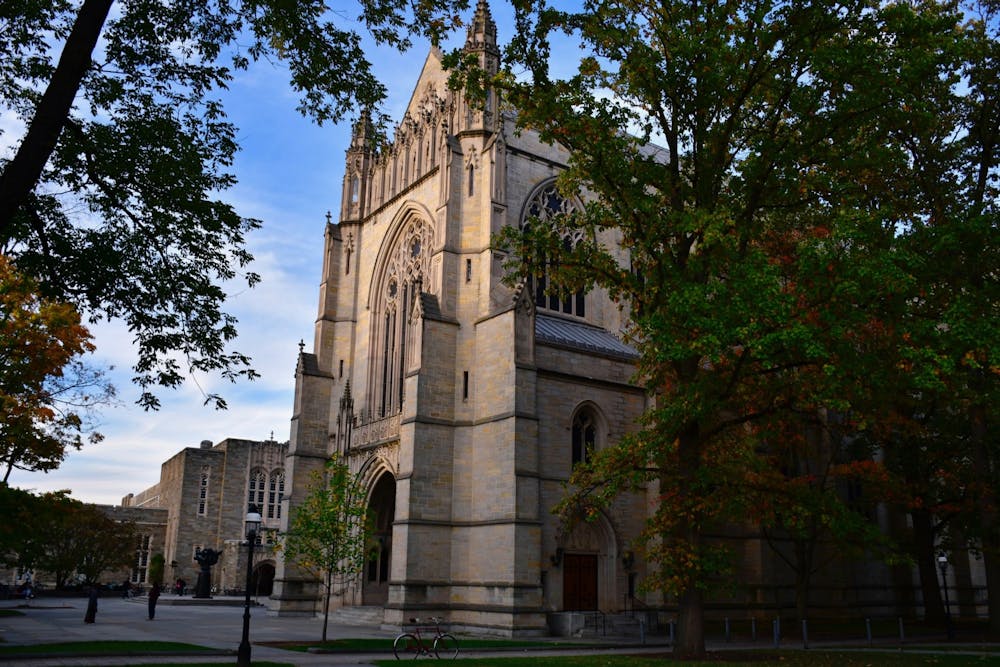The following is a guest contribution and reflects the author’s views alone. For information on how to submit to the Opinion Section, click here.
The monumental news that Princeton was renaming “concentrations” to “majors” and allowing departments to create minors slipped under the radar at the end of last term. Students may have been indifferent to the change or appreciated that their degree would be easier to explain. But this change in terminology cuts away at Princeton’s academic distinctiveness. We must ensure that Princeton’s academic rigor isn’t diluted in the same way.
Many students may not be aware of what made Princeton academically unique in the first place. I didn’t either until I came across an awkwardly sized gate last spring on a bike ride back to campus from the Graduate College — the Luther P. Eisenhart Gateway. Curious, I read up on Dean Eisenhart — a mathematician, math professor, Dean of the Faculty, but most importantly, the pioneer of Princeton’s thesis requirement.
Dean Eisenhart was the first to propose the “Four Course Plan,” which required all students to take a larger percentage of their courses in their department and complete a thesis during their senior year. Eisenhart wanted to give all students the opportunity to earn honors based on their theses. Until this change, only students who performed well in lower-level courses had the opportunity to earn honors with a thesis. Students and alumni did not easily accept Eisenhart’s plan.
Eisenhart’s plan was deeply controversial. The plan was so hated that the Class of 1925, the first class to whom the thesis requirement applied, adorned their beer jackets with an illustration of a tiger crushed by four books. The Class of 1927 departed Princeton with a song on the steps of Nassau Hall condemning Dean Eisenhart for “originating the four-course plan.” Some alumni, upset about the increased rigor of the plan, even blamed the poor performance of the football team on the thesis requirement.
This change came in the wake of Princeton’s evolution from a simple college to a university that puts a greater emphasis on educational rigor. Not until the University’s sesquicentennial in 1896 did the College of New Jersey change its name to Princeton. The graduate school was established the same year. Before these changes, Princeton awarded graduate degrees to any student who returned three years later with letters certifying that they had been doing productive work in their field. Eisenhart’s push for a more rigorous education advanced Princeton’s transition to a true university.
The independent work that Eisenhart inaugurated is now central to the idea of mastery that a Princeton degree represents. Many universities only ask students who seek honors to complete an undergraduate thesis. But unlike degrees from other institutions, a Princeton degree represents the culmination of careful personal research. It’s in that context that the term “concentration” must be viewed. What Princeton students study is not just a reflection of their coursework, it is what they have researched deeply, with intense focus and concentration.
When the University announced its changes in terminology, Dean Dolan said that the changes were motivated by a desire to “better align us with other colleges and universities while preserving exactly what concentrations and certificates already do.” However, the unique names fit unique programs. Why apply the “major” name to a program that differs significantly from its peers? The words “concentration” and “certificate” simply allowed Princeton students to explain what was so unique about their education compared to those of peers at other universities.

Allowing students to pick up single-department minors has the unfortunate potential to wreck one of the tenets of any Princeton degree. Princeton students cannot double-concentrate (or I suppose, regretfully, now double-major), because mastery of two subjects captured in a thesis is considered too onerous a burden. Yet by randomly tossing out the term “minor,” Princeton now admits that students can achieve partial competence in a second field.
One may wonder why the terminology matters at all. But when we see Princeton abandoning its unique terminology in favor of conformity, one wonders how it will withstand the pressures for a less rigorous curriculum. Student distaste for departmental and thesis requirements go back to the very establishment of these requirements. Will the University decide that the thesis is unnecessary next? We don’t have to move in that direction: departments considering a minor program should be sure to require independent work and uphold Princeton’s rigor. The University and its students are better off with Eisenhart’s push to require the thesis. We can’t let that vision falter.
Like their predecessors 100 years earlier, the Class of 2025 will have the ability to try out a new academic program. It is up to the University whether this is a step forward or backward.
John Raulston Graham is a junior majoring in architecture from Portland, Tenn. He is the Orange Key Guide Service historian and a member of the Princetoniana committee. He can be reached at jrgraham@princeton.edu. Graham is a former features writer for the ‘Prince.’









